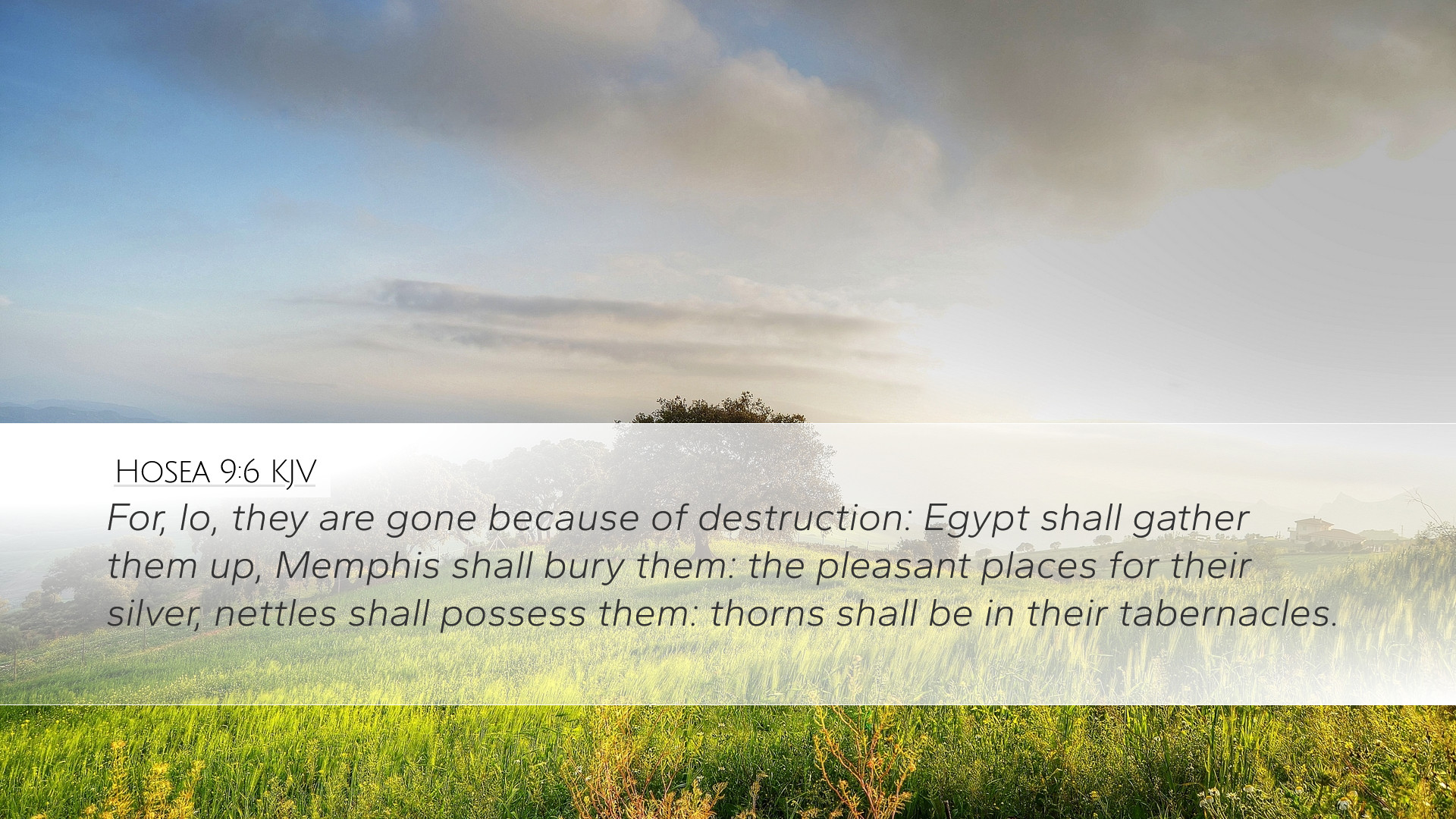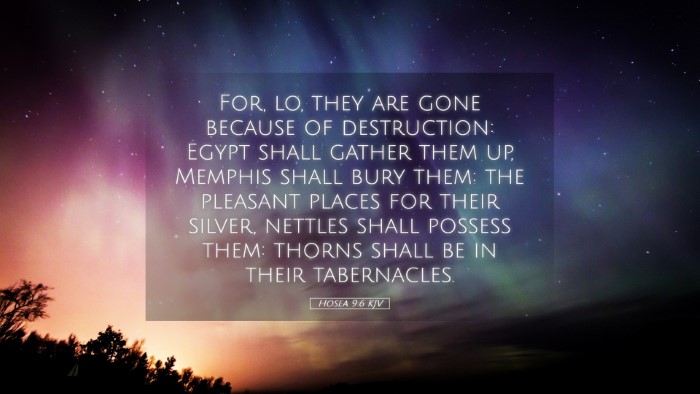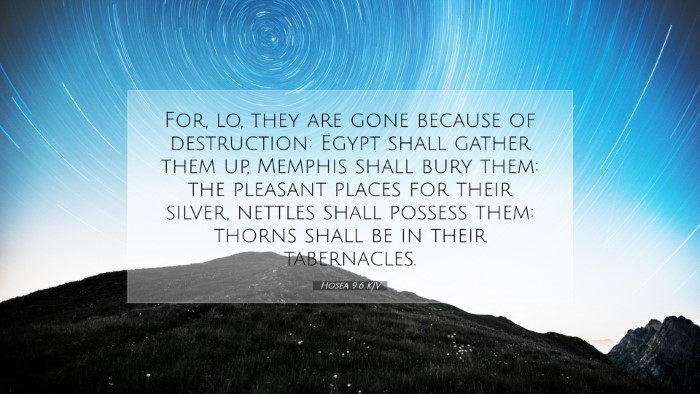Old Testament
Genesis Exodus Leviticus Numbers Deuteronomy Joshua Judges Ruth 1 Samuel 2 Samuel 1 Kings 2 Kings 1 Chronicles 2 Chronicles Ezra Nehemiah Esther Job Psalms Proverbs Ecclesiastes Song of Solomon Isaiah Jeremiah Lamentations Ezekiel Daniel Hosea Joel Amos Obadiah Jonah Micah Nahum Habakkuk Zephaniah Haggai Zechariah MalachiHosea 9:6
Hosea 9:6 KJV
For, lo, they are gone because of destruction: Egypt shall gather them up, Memphis shall bury them: the pleasant places for their silver, nettles shall possess them: thorns shall be in their tabernacles.
Hosea 9:6 Bible Commentary
Bible Commentary on Hosea 9:6
Bible Verse: "For, lo, they are gone because of destruction: Egypt shall gather them up, Memphis shall bury them: the pleasant places for their silver, nettles shall possess them: thorns shall be in their tents." (Hosea 9:6)
Introduction
The verse from Hosea 9:6 is a poignant expression of the inevitable consequences of Israel's infidelity and sin against God. It reflects not only God's judgment but also the loss of prosperity and security that accompanies turning away from divine precepts. The insights from various public domain commentaries will enrich our understanding of the multifaceted implications of this scripture for pastors, students, theologians, and scholars.
Context of Hosea 9:6
The Book of Hosea addresses the Northern Kingdom of Israel during a time of moral decay and spiritual idolatry. The prophet Hosea, using the metaphor of marriage, powerfully illustrates Israel’s unfaithfulness to God, the covenant partner. This reflects a broader theme of abandonment that necessitates divine judgment.
Matthew Henry highlights that Hosea’s prophecies are both a warning and a declaration of impending doom due to their rampant idolatry, reflecting God’s intention to bring about repentance through a realization of their misfortune.
Structured Analysis of Hosea 9:6
1. The Impact of Destruction
The verse starts with a stark declaration: "For, lo, they are gone because of destruction." This statement implies a significant loss, not only in numbers but also in relationships and spiritual standing before God. Hosea emphasizes the reality of Israel’s consequences for their actions.
Albert Barnes notes that destruction refers to the impending military conquest by foreign nations, leading to the capture and exile of the Israelites. This loss encompasses both physical removal from their homeland and spiritual alienation from God.
2. Egypt's Role in Judgment
The term "Egypt" symbolizes oppression and judgment throughout the Old Testament. The mention of Egypt gathering Israel signifies that their former captors would now play a role in their punishment, illustrating a complete reversal of fortunes.
Adam Clarke explicates that the Egyptians, who once were oppressors, would now take captives of those who once were free and enjoying prosperity. This serves as a stark reminder of how Israel's sin has led them into the hands of their enemies.
3. The Burial in Memphis
Memphis, an ancient city in Egypt, is specifically mentioned for burial, suggesting not only physical death but a spiritual death as well. The people of Israel, once thriving in their land, would face extinction and be consigned to the dust of a foreign land.
Matthew Henry remarks on the irony of burial in a land that represents paganism, indicating their forsaking of Yahweh – the very God who promised to protect and prosper them.
4. The Loss of Prosperity
The next phrases draw attention to the loss of once-pleasurable possessions: "the pleasant places for their silver, nettles shall possess them." Here, the imagery of pleasant places suggests the wealth and beauty of the Israelite's land. In contrast, the mention of nettles depicts barrenness and desolation.
Albert Barnes suggests that the former delights of the Israelites would be replaced with weeds symbolizing a cursed land, reflecting on the promises of God that were contingent upon their obedience.
5. The Symbolism of Thorns
Finally, "thorns shall be in their tents" serves as a powerful metaphor for strife and discomfort in their lives. Where the Israelites once dwelt in safety, harmony, and joy, they will now find hostility and distress.
Adam Clarke indicates that thorns are emblematic of God’s curse upon the land due to disobedience, extending back to Genesis. This not only illustrates a physical manifestation of decay but also highlights the spiritual thorn in their relationship with God.
Lessons for Today
The losses described in Hosea 9:6 speak to modern audiences about the importance of faithfulness in a relationship with God. Just as Israel faced destruction and removal due to infidelity, individuals and communities can face repercussions for turning away from divine truths.
- Faithfulness to God: This passage serves as a reminder to uphold one's covenant with God, acknowledging the importance of obedience.
- Awareness of Consequences: The depiction of physical and spiritual decline emphasizes the reality that choices carry weight and that disobedience leads to suffering.
- Importance of Repentance: Hosea calls for introspection and correction. Pastors and theologians can draw from this theme the necessity of ongoing repentance in the life of believers.
Conclusion
Hosea 9:6 encapsulates the dire consequences of unfaithfulness to God through vivid imagery and profound warning. Drawing from the insights of Matthew Henry, Albert Barnes, and Adam Clarke, we understand that this scripture serves as both a historical account and a timeless lesson on the ramifications of sin, emphasizing that God's justice is irrevocable and that His call for repentance is earnest.


